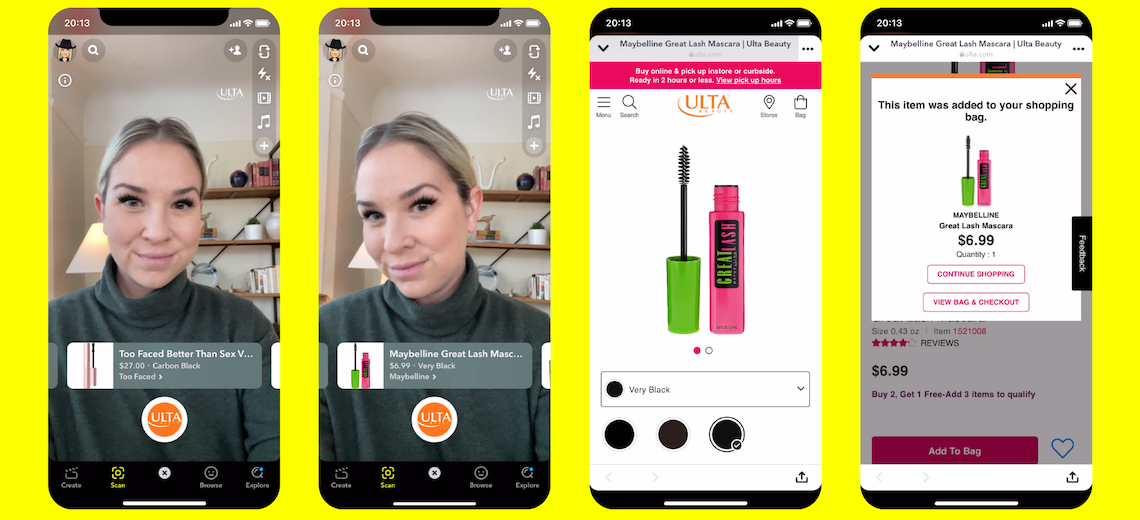Snapchat continues to ramp up its shoppable AR beauty try-on tech as it enlists Ulta Beauty and MAC Cosmetics for its new lens capabilities.
On Wednesday, Ulta Beauty and MAC Cosmetics became the first two beauty companies to launch a new version of the platform’s shoppable AR lenses. Called the Catalog-Powered Shopping Lens, the AR filter allows users to swipe through virtual makeup looks with a selection of different products and brands linked directly to a company’s product catalog. In addition, SKU-specific product details are now provided, and any brand updates to products’ prices and colors are updated in real-time.
“Gen Z is looking for different ways to engage and interact with the products and brands that they care about,” said Rajni Jacques, global head of fashion and beauty partnerships at Snapchat. According to data from the platform, users engage with its AR features more than 6 billion times a day. Snapchat also states that 93% of its users are interested in using AR for shopping.
According to Natalie Salim, manager for paid social at Ulta Beauty, “Immersive commerce with AR continues to be a priority of Ulta Beauty’s strategy on the platform,” with the benefit of “creating highly personalized and inclusive experiences.”

With the new feature, any brand can upload their product catalog to Snapchat to enable AR try-on with links to purchase. Snapchat emphasizes that this allows brands to access real-time analytics on how users are interacting with their products on the platform.
The Ulta Beauty lens is exclusively focused on mascara, for now, with versions by Maybelline, Too Faced, Benefit Cosmetics, L’Oréal and Tarte featured.
According to Jacques, being able to consult with friends on products is an important component of social shopping for the Gen-Z audience.
“You can send a lens to your friends, so there is a lot of talking back and forth,” she said. “There’s a lot of reassuring, like, ‘Oh my gosh, that looks amazing on you. Get it now.’”
Snapchat has been ramping up its shoppable AR functionality for beauty over the past several years. In December 2020, it launched a partnership with Perfect Corp. Estée Lauder Companies portfolio brands MAC Cosmetics, Too Faced, Bobbi Brown and Smashbox were among the early adopters of the Perfect Corp.-enabled lenses. Over the holiday season, Kaja Beauty and NYX Cosmetics created AR holiday shopping lenses, and were joined by a range of consumer brands in other categories as part of Snapchat’s “Holiday Market” promotion.
Ulta Beauty’s and MAC Cosmetics’ new catalog-powered shoppable lenses were created through Snapchat’s in-house Lens Web Builder that was launched in 2020 to allow brands to make their own lenses. Beauty products that brands can feature using Lens Web Builder include lipstick, blush, eyeshadow and mascara, among others. The platform is also currently “ramping up” its AR try-on capabilities for foundation, said Jacques.
Snapchat is among several major tech platforms that have accelerated shoppable AR makeup try-on during the pandemic, including Google, Pinterest and Instagram. In December 2020, Google launched AR makeup try-on capabilities connected to Google Shopping, in partnership with Perfect Corp. and ModiFace. In January 2021, Pinterest added shoppable eyeshadow try-on. In June 2021, NYX Professional Makeup, Urban Decay, Maybelline New York and Lancôme became the first L’Oréal brands to introduce AR try-on to their Instagram shops.
Already of interest before the pandemic, AR try-on has especially caught brands’ and platforms’ interest as product testers remain a hygiene concern.
“The pandemic and the rules behind it to keep everyone safe have changed how we shop,” said Jacques. “And it’s definitely changed that routine of going into a department store and trying every color out, seeing what’s there and touching everything with your hands.”




